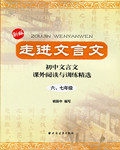题目内容
Not everyone ________ recognized the correctness of these principles.
- A.at first
- B.at a time
- C.at any rate
- D.at most
四个选项的介词短语意思分别为:at first起初,开始时;at a time每次,一次;at any rate无论如何;at most至多。at first多用于句首或句末,通常用来和后来发生的事物相对照,即at first修饰的句子的意思往往和后来发生的事相反。句意:不是每个人一开始就能认识到这些原则的正确性。

 走进文言文系列答案
走进文言文系列答案—Tom, can you go shopping with me?
—No, I can’t. Actually ______ likes shopping.
| A.not someone | B.no someone | C.no everyone | D.not everyone |
I hadn’t even got a chance to enter the store before an African American woman approached me and asked if I would help her return an item. The item she had 36 was intended for her daughter, but she had already received a 37 one. The lady 38 to exchange the item for something else in the store but she was told she needed an ID 39 the deal could not take place.
I went to the 40 with the woman so we could use my ID. The sales associate immediately started 41 her of asking the first 42 person she saw to help her. Although that was 43 , I didn’t understand why it 44 . After all, not everyone is given the opportunity to 45 an ID in this country.
Then, we asked to speak with a manager, who explained that there was no 46 to return the item without a receipt and then went on to say the woman could not 47 she purchased the item.
“ 48 I, a young white female, were to enter the store and request you to make an exchange without a receipt, I would not be 49 the privilege — as I have proof from the past.” I said. He must have realized at that moment what he had done, because he 50 to exchange the item.
There are many valuable lessons in the story. The first is to help a stranger in need. I 51 when the woman asked for my help, but 52 in my head I asked myself, “Why not? What valid 53 do I actually have?” I had none, so I helped her.
The second lesson is not to judge a book by its 54 . The woman looked poor, but she 55 _ the same treatment as anyone else does.
| 【小题1】 |
|
| 【小题2】 |
|
| 【小题3】 |
|
| 【小题4】 |
|
| 【小题5】 |
|
| 【小题6】 |
|
| 【小题7】 |
|
| 【小题8】 |
|
| 【小题9】 |
|
| 【小题10】 |
|
| 【小题11】 |
|
| 【小题12】 |
|
| 【小题13】 |
|
| 【小题14】 |
|
| 【小题15】 |
|
| 【小题16】 |
|
| 【小题17】 |
|
| 【小题18】 |
|
| 【小题19】 |
|
| 【小题20】 |
|
 believe that the only way we can be special is by being better than someone else, but we are often disappointed. There will always be someone out there who is better than we are at something. There are plenty of people around who may not be as smart as we are but who are better at sports. Or they may not be as good-looking, but they have more money. It is impossible for us to be better than everyone else all the time.
believe that the only way we can be special is by being better than someone else, but we are often disappointed. There will always be someone out there who is better than we are at something. There are plenty of people around who may not be as smart as we are but who are better at sports. Or they may not be as good-looking, but they have more money. It is impossible for us to be better than everyone else all the time. are
are